Shinjuku Station
Shinjuku Station (新宿駅, Shinjuku-eki) is a major railway station in the Shinjuku and Shibuya wards in Tokyo, Japan. In Shinjuku, it is part of the Nishi-Shinjuku and Shinjuku districts. In Shibuya, it is located in the Yoyogi and Sendagaya districts. It is the world's busiest railway station.
Shinjuku Station 新宿駅 | |
|---|---|
 Appearance on the south side of Shinjuku Station in June 2018 | |
| General information | |
| Location | Shinjuku and Shibuya wards, Tokyo Japan |
| Operated by |
|
| Connections |
|
| History | |
| Opened | 1885 |
| Location | |
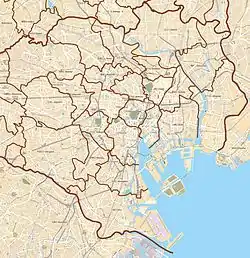 Shinjuku Station Location within Special wards of Tokyo  Shinjuku Station Shinjuku Station (Tokyo)  Shinjuku Station Shinjuku Station (Japan) | |
Serving as the main connecting hub for rail traffic between Tokyo's special wards and Western Tokyo on inter-city rail, commuter rail, and subway lines, the station was used by an average of 3.59 million people per day in 2018, making it, by far, the world's busiest station (and registered as such with Guinness World Records).[1] The main JR station and the directly adjacent private railways have a total of 35 platforms, including an underground arcade, above ground arcade and numerous hallways with another 17 platforms (53 total) can be accessed through hallways to 5 directly connected stations without surfacing outside. The entire above/underground complex has well over 200 exits.
Lines
Shinjuku is served by the following railway systems:
.svg.png.webp) JR East:
JR East:
- ■ Chūō Main Line (Limited Express)
- JC Chūō Line (Rapid)
- JB Chūō–Sōbu Line
- JA Saikyō Line
- JS Shōnan–Shinjuku Line
- JY Yamanote Line
 Keio Corporation:
Keio Corporation:
- KO Keio Line
- KO Keio New Line
 Odakyu Electric Railway:
Odakyu Electric Railway:
- OH Odakyu Odawara Line
 Toei Subway:
Toei Subway:
- E Toei Oedo Line
- S Toei Shinjuku Line
 Tokyo Metro:
Tokyo Metro:
- M Marunouchi Line
Station facilities
JR East
SJKJY17JC05JB10JS20JA11 Shinjuku Station 新宿駅 | |||||||||||||||||||||||||||||||||||||||||||||||||||||||||||||||||||||||||||||||||||||||||||||
|---|---|---|---|---|---|---|---|---|---|---|---|---|---|---|---|---|---|---|---|---|---|---|---|---|---|---|---|---|---|---|---|---|---|---|---|---|---|---|---|---|---|---|---|---|---|---|---|---|---|---|---|---|---|---|---|---|---|---|---|---|---|---|---|---|---|---|---|---|---|---|---|---|---|---|---|---|---|---|---|---|---|---|---|---|---|---|---|---|---|---|---|---|---|
| JR East station | |||||||||||||||||||||||||||||||||||||||||||||||||||||||||||||||||||||||||||||||||||||||||||||
 Shinjuku Station South entrance in October 2021 | |||||||||||||||||||||||||||||||||||||||||||||||||||||||||||||||||||||||||||||||||||||||||||||
| General information | |||||||||||||||||||||||||||||||||||||||||||||||||||||||||||||||||||||||||||||||||||||||||||||
| Location | 3-38-1 Shinjuku, Shinjuku, Tokyo Japan | ||||||||||||||||||||||||||||||||||||||||||||||||||||||||||||||||||||||||||||||||||||||||||||
| Operated by | |||||||||||||||||||||||||||||||||||||||||||||||||||||||||||||||||||||||||||||||||||||||||||||
| Line(s) | Yamanote Line Chūō Main Line | ||||||||||||||||||||||||||||||||||||||||||||||||||||||||||||||||||||||||||||||||||||||||||||
| Connections | Bus terminal | ||||||||||||||||||||||||||||||||||||||||||||||||||||||||||||||||||||||||||||||||||||||||||||
| History | |||||||||||||||||||||||||||||||||||||||||||||||||||||||||||||||||||||||||||||||||||||||||||||
| Opened | 1885 | ||||||||||||||||||||||||||||||||||||||||||||||||||||||||||||||||||||||||||||||||||||||||||||
| Passengers | |||||||||||||||||||||||||||||||||||||||||||||||||||||||||||||||||||||||||||||||||||||||||||||
| FY2015 | 775,386 daily[2] | ||||||||||||||||||||||||||||||||||||||||||||||||||||||||||||||||||||||||||||||||||||||||||||
| Services | |||||||||||||||||||||||||||||||||||||||||||||||||||||||||||||||||||||||||||||||||||||||||||||
| |||||||||||||||||||||||||||||||||||||||||||||||||||||||||||||||||||||||||||||||||||||||||||||
The station is centered around facilities servicing the East Japan Railway Company (JR East) lines. These consist of eight ground-level island platforms (16 tracks) on a north-south axis, connected by two overhead and two underground concourses. Most JR services here are urban and suburban mass transit lines, although many limited express services to Kōfu and Matsumoto on the Chūō Main Line and to Nikkō and Kinugawa Onsen via joint operations with the private Tōbu Railway also begin and end at this station, including Narita Express services to and from Narita International Airport. The JR section alone handles an average of 1.5 million passengers a day.
 East gates in July 2021
East gates in July 2021 West gates in July 2021
West gates in July 2021 Internal concourse in July 2021
Internal concourse in July 2021 Central East gates in November 2021
Central East gates in November 2021 Central West gates in September 2021
Central West gates in September 2021 Central South gates in November 2021
Central South gates in November 2021.jpg.webp) South East gates in April 2021
South East gates in April 2021 Koshu Kaido gates in September 2021
Koshu Kaido gates in September 2021 Miraina Tower gates in September 2021
Miraina Tower gates in September 2021 New South gates in September 2021
New South gates in September 2021
| 1-2 | JA Saikyō Line | for Shibuya, Ōsaki, and Shin-Kiba (via the R Rinkai Line) |
| for Hazawa yokohama-kokudai and Ebina (via the | ||
| for Ikebukuro, Ōmiya, and Kawagoe (via the ■ Kawagoe Line) | ||
| JS Shōnan-Shinjuku Line | for Yokohama, Ōfuna, Chigasaki, Hiratsuka, Kōzu, and Odawara (via the JT Tōkaidō Main Line) | |
| for Yokohama, Ōfuna, Kamakura, and Zushi (via the JO Yokosuka Line) | ||
| 3 | JA Saikyō Line | for Ikebukuro, Ōmiya, and Kawagoe (via the ■ Kawagoe Line) |
| 4 | JA Saikyō Line | for Ikebukuro, Ōmiya, and Kawagoe (via the ■ Kawagoe Line) |
| JS Shōnan-Shinjuku Line | for Ōmiya, Kumagaya, and Takasaki (via the JU Takasaki Line) | |
| for Ōmiya, Oyama, and Utsunomiya (via the JU Utsunomiya Line) | ||
| 5-6 | ■ Limited Express | ■ Home Liner Odawara for Odawara |
| ■ Kinugawa for Kinugawa-Onsen | ||
| ■ Narita Express for Ikebukuro, Takao, and Ōmiya | ||
| ■ Narita Express for Narita Airport | ||
| ■ Nikkō for Tōbu Nikkō | ||
| ■ Super View Odoriko for Atami, Itō, and Izukyū Shimoda | ||
| 7-8 | JC Chūō Line (Rapid) | for Ochanomizu and Tokyo |
| Ltd. Express Hachiōji / Ōme for Tokyo | ||
| ■ Ltd. Express Azusa / Kaiji for Tokyo[Note 1] and Chiba[Note 2] | ||
| ■ Ltd. Express Shinjuku Sazanami for Chiba and Tateyama | ||
| ■ Ltd. Express Shinjuku Wakashio for Chiba and Awa-Kamogawa | ||
| 9-10 | JC Chūō Line (Rapid) | Ltd. Express Hachiōji for Hachiōji |
| Ltd. Express Ōme for Ōme | ||
| ■ Chūō Main Line | Ltd. Express Azusa for Matsumoto and Minami-Otari | |
| Ltd. Express Fuji Excursion for Kawaguchiko | ||
| Ltd. Express Kaiji for Kōfu and Ryūō | ||
| 11-12 | JC Chūō Line (Rapid) | for Nakano, Tachikawa, Hachiōji, Takao, and Ōtsuki |
| for Haijima and Ōme (via the JC Ōme Line) | ||
| for Musashi-Itsukaichi (via the JC Itsukaichi Line) | ||
| ■ for Komagawa (via the ■ Hachikō Line) | ||
| 13 | JB Chūō-Sōbu Line | for Suidōbashi, Akihabara, and Chiba |
| 14 | JY Yamanote Line (counter-clockwise) | for Harajuku, Shibuya, and Shinagawa |
| 15 | JY Yamanote Line (clockwise) | for Ikebukuro, Tabata, Nippori, and Ueno |
| 16 | JB Chūō-Sōbu Line | for Higashi-Nakano, Nakano, and Mitaka |
 JR East platforms 1 and 2
JR East platforms 1 and 2 JR East platforms 3 and 4
JR East platforms 3 and 4 JR East platforms 5 and 6
JR East platforms 5 and 6 JR East platforms 7 and 8
JR East platforms 7 and 8 JR East platforms 9 and 10
JR East platforms 9 and 10 JR East platforms 11 and 12
JR East platforms 11 and 12 JR East platforms 13 and 14
JR East platforms 13 and 14 JR East platforms 15 and 16
JR East platforms 15 and 16 Station layout
Station layout
- Azusa No. 2, 6, and 8, as well as Kaiji No. 4 continue to Tokyo.
- Azusa No. 30 continues to Chiba.
Odakyu
 Shinjuku Station 新宿駅 | |||||||||||||||||||||||||||
|---|---|---|---|---|---|---|---|---|---|---|---|---|---|---|---|---|---|---|---|---|---|---|---|---|---|---|---|
| Odakyu station | |||||||||||||||||||||||||||
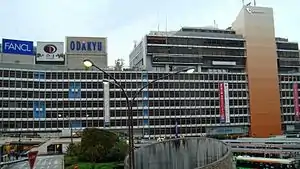 West exit of Odakyu Shinjuku Station | |||||||||||||||||||||||||||
| General information | |||||||||||||||||||||||||||
| Location | 1-1-3 Nishishinjuku, Shinjuku, Tokyo Japan | ||||||||||||||||||||||||||
| Operated by | |||||||||||||||||||||||||||
| Line(s) | |||||||||||||||||||||||||||
| History | |||||||||||||||||||||||||||
| Opened | 1927 | ||||||||||||||||||||||||||
| Passengers | |||||||||||||||||||||||||||
| FY2015 | 492,324 daily | ||||||||||||||||||||||||||
| Services | |||||||||||||||||||||||||||
| |||||||||||||||||||||||||||
The terminus for the private Odakyu Odawara Line is parallel to the JR platforms on the west side, and handles an average of 490,000 passengers daily. This is a major commuter route stretching southwest through the suburbs and out towards the coastal city of Odawara and the mountains of Hakone. The ten platforms are built on two levels beneath the Odakyu department store; three express service tracks (six platforms) on the ground level and two tracks (four platforms) on the level below. Each track has platforms on both sides in order to completely separate boarding and alighting passengers.
Chest-high platform screen doors were added to platforms 4 and 5 in September 2012.[3]
Ground level
| 1 | ■ | Not in use |
| 2, 3 | ■ Ltd. Express. "Romancecar" | for Odawara, Hakone-Yumoto, Fujisawa, and Gotemba |
| 4, 5 | ■ Rapid Express | for Shin-Yurigaoka, Machida, Ebina, Hon-Atsugi, Shin-Matsuda, Odawara, Chūō-Rinkan, Yamato, Shōnandai and Fujisawa |
| ■ Express | for Noborito, Shin-Yurigaoka, Machida, Ebina, Hon-Atsugi, Shin-Matsuda, Odawara, Chūō-Rinkan, Yamato, Shōnandai, Fujisawa and Katase-Enoshima | |
| 6 | ■ | (Alighting only) |
Underground level
| 7 | ■ | (Alighting only) |
| 8, 9 | ■ Local | for Shin-Yurigaoka, Sagami-Ono, and Hon-Atsugi |
| 10 | ■ | (Alighting only) |
 South gate
South gate West gate
West gate Ground level platform 1
Ground level platform 1 Ground level platforms 2 and 3
Ground level platforms 2 and 3 Ground level platforms 4 and 5
Ground level platforms 4 and 5 Ground level platform 6
Ground level platform 6 Underground platforms
Underground platforms
Keio/Toei Subway (Toei Shinjuku Line)
S01 Shinjuku Station 新宿駅 | |||||||||||||||||||||||||||||||||||||||
|---|---|---|---|---|---|---|---|---|---|---|---|---|---|---|---|---|---|---|---|---|---|---|---|---|---|---|---|---|---|---|---|---|---|---|---|---|---|---|---|
| Keio/Toei Subway station | |||||||||||||||||||||||||||||||||||||||
 West exit of Keio Shinjuku Station | |||||||||||||||||||||||||||||||||||||||
| General information | |||||||||||||||||||||||||||||||||||||||
| Location | 1-1-4 Nishishinjuku, Shinjuku, Tokyo Japan | ||||||||||||||||||||||||||||||||||||||
| Operated by | |||||||||||||||||||||||||||||||||||||||
| Line(s) |
| ||||||||||||||||||||||||||||||||||||||
| History | |||||||||||||||||||||||||||||||||||||||
| Opened | 1915 | ||||||||||||||||||||||||||||||||||||||
| Rebuilt | 1978 | ||||||||||||||||||||||||||||||||||||||
| Passengers | |||||||||||||||||||||||||||||||||||||||
| FY2015 | 757,823 daily | ||||||||||||||||||||||||||||||||||||||
| Services | |||||||||||||||||||||||||||||||||||||||
| |||||||||||||||||||||||||||||||||||||||
Keio operates two sections of Shinjuku Station, the traditional Keio Line stub terminal and a separate through station connecting the Keio New Line with the Toei Shinjuku Line. In 2019, 788,567 passengers used the Keio complex daily (Keio and Keio New Lines), which makes among the busiest amongst the non-JR Group railways of Japan.[4]
Keio Line
The Keio Line concourse is located to the west of the Odakyu line concourse, two floors below ground level under Keio department store. It consists of three platforms stretching north to south. This suburban commuter line links Shinjuku to the city of Hachiōji to the west.[5] Chest-high platform edge doors were introduced on the Keio Line platforms in March 2014.[6] The doors are different colours for each platform. The doors on platform 2 are green.[6]
| 1 | KO Local | for Meidaimae, Chōfu, Keio Tama Center, Hashimoto, Keio Hachiōji, and Takaosanguchi |
| 2 | KO Keio Liner, Special Express, Semi-Special Express, Express, Semi Express, Rapid, Local | for Meidaimae, Chōfu, Keio Tama Center, Hashimoto, Keio Hachiōji, and Takaosanguchi |
| ' | KO | (Alighting only) |
| 3 | KO Special Express, Semi-Special Express, Express, Semi Express, Rapid | for Meidaimae, Chōfu, Keio Tama Center, Hashimoto, Keio Hachiōji, and Takaosanguchi |
 West gates
West gates Lumine gates
Lumine gates Keio Department Store gates
Keio Department Store gates Hiroba gates (for entry only)
Hiroba gates (for entry only) Platforms 1 and 2
Platforms 1 and 2 Platforms for getting off
Platforms for getting off Platform 3
Platform 3
Keio New Line and Toei Shinjuku Line
The shared facilities for the Toei Shinjuku subway line and the Keiō New Line are distinctively called Keiō New Line Shinjuku Station (新線新宿駅, Shinsen Shinjuku-eki) and consist of two platforms stretching east-west five floors beneath the Kōshū Kaidō avenue to the southwest of the JR section. The concourse is managed by Keio Corporation but is in a separate location to the main Keio platforms. Further south (and deeper underground) are the two north-to-south Toei Ōedo subway line platforms.
| 4 | KO Keio New Line | for Hatsudai, Hatagaya, Meidaimae, Chōfu, and Hashimoto |
| 5 | S Toei Shinjuku Line | for Ichigaya, Kudanshita, Jimbocho, Ōjima, and Moto-Yawata |
 Ticket gates for Keio New Line and Toei Shinjuku Line, 2010
Ticket gates for Keio New Line and Toei Shinjuku Line, 2010 Island platform for Keio New Line and Toei Shinjuku Line, 2010
Island platform for Keio New Line and Toei Shinjuku Line, 2010
Toei Subway (Toei Oedo Line)
E27 Shinjuku Station 新宿駅 | |||||||||||
|---|---|---|---|---|---|---|---|---|---|---|---|
| Toei Subway station | |||||||||||
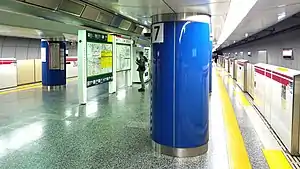 Oedo Line platform | |||||||||||
| General information | |||||||||||
| Location | 2-1-1 Yoyogi, Shibuya, Tokyo Japan | ||||||||||
| Operated by | |||||||||||
| Line(s) |
| ||||||||||
| Connections | Shinjuku Expressway Bus Terminal | ||||||||||
| Other information | |||||||||||
| Station code | E-27 | ||||||||||
| History | |||||||||||
| Opened | 1997 | ||||||||||
| Services | |||||||||||
| |||||||||||
Toei Oedo Line's two underground platforms stretch north-south to the south of the Toei Shinjuku Line and Keio New Line facilities. This is on the 7th basement floor of Tokyo prefectural road 414(Yotsuya-Tsunohazu Ave.).
| 6 | E Toei Oedo Line | for Roppongi and Daimon |
| 7 | E Toei Oedo Line | for Tochōmae and Hikarigaoka |
Tokyo Metro
M08 Shinjuku Station 新宿駅 | |||||||||||
|---|---|---|---|---|---|---|---|---|---|---|---|
| Tokyo Metro station | |||||||||||
 Marunouchi Line platform | |||||||||||
| General information | |||||||||||
| Location | 1st Nishiguchi Chikagai,1 Nishishinjuku, Shinjuku, Tokyo Japan | ||||||||||
| Operated by | |||||||||||
| Line(s) |
| ||||||||||
| Other information | |||||||||||
| Station code | M-08 | ||||||||||
| History | |||||||||||
| Opened | 1959 | ||||||||||
| Services | |||||||||||
| |||||||||||
Tokyo Metro's two Marunouchi Line underground platforms stretch east-west to the north of the JR and Odakyu facilities, directly below the Metro Promenade underground mall.
| 1 | M Marunouchi Line | for Nakano-sakaue, Ogikubo, and Hōnanchō |
| 2 | M Marunouchi Line | for Akasaka-mitsuke, Ginza, Ōtemachi, and Ikebukuro |
Commercial facilities
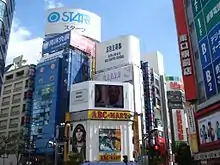
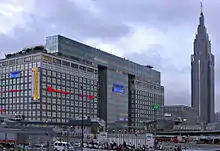
Many department stores and shopping malls are built directly into the station. These include
- Lumine Est – above JR's east exit
- Odakyu department store – above the Odakyu line concourse
- Odakyu Mylord – above the southern end of Odakyu line concourse
- Lumine 1 shopping mall – above the Keio Line concourse
- Lumine 2 shopping mall – above JR's south and Lumine exits
- Keio Department store – above the Keio Line concourse
- Keio Mall – underground mall to the southwest of the Keio Line concourse
- Odakyu Ace – underground malls beneath the bus terminal by the west exit.
In addition to the above, the Metro Promenade, which is an underground mall owned by Tokyo Metro, extends eastwards from the station beneath Shinjuku-dori avenue, all the way to the adjacent Shinjuku-sanchōme station with 60 exits along the way. The Metro Promenade in turn connects to Shinjuku Subnade, another underground shopping mall, which leads onto Seibu Railway's Seibu-Shinjuku station.
Shinjuku Station is connected by underground passageways and shopping malls to:
- Nishi-Shinjuku Station (Tokyo Metro Marunouchi Line)
- Seibu Shinjuku Station (Seibu Shinjuku Line)
- Shinjuku-nishiguchi Station (Toei Ōedo Line)
- Shinjuku-sanchōme Station (Tokyo Metro Marunouchi Line, Tokyo Metro Fukutoshin Line, and Toei Shinjuku Line)
- Tochōmae Station (Toei Ōedo Line)
Nearby non-connected stations (within 500 meters of an underground passageway or station) include:
- Shinjuku-gyoemmae Station
- Yoyogi station
- Higashi-Shinjuku Station
- Okubo Station
- Shin-Okubo Station
- Minami-Shinjuku Station
Bus terminals
There is a bus terminal at the west exit servicing both local and long-distance buses, and a JR Highway Bus terminal at the New South Gates.
On April 4, 2016, the new bus terminal and commercial facilities nearby south exit, named Busta Shinjuku (Shinjuku Expressway Bus Terminal), opened for service.[7] Considerable numbers of the coaches and the airport buses depart from this new terminal.
Passenger statistics
The figures below are the official number of passengers entering and exiting (except for JR East) each day released by each train operator. The figure for JR East only includes entering passengers.
| Operator | Number | Fiscal year | Source | Note | |
|---|---|---|---|---|---|
| JR East | 751,018 (boarding only) | 2013 | [8] | Boarding passengers only. Busiest station in Japan. | |
| Odakyu | 494,184 | 2013 | [9] | The busiest Odakyu station | |
| Keio | 730,849 | 2013 | [10] | The busiest Keio station, sum of the ridership of the Keiō New Line and Keiō Line. | |
| Tokyo Metro | 227,366 | 2013 | [11] | The 6th busiest Tokyo Metro station | |
| Toei | Shinjuku Line | 266,869 | 2013 | 134,185 entries and 132,684 exits[12] | The busiest Toei subway station |
| Oedo Line | 133,075 | 2013 | 64,701 entries and 68,374 exits[12] | ||
Average number of passengers per day by fiscal year for the JR East station (1913 - 1935)
| Fiscal year | Daily average |
|---|---|
| 1913 | 5,052[13] |
| 1915 | 4,684 |
| 1920 | 14,358 |
| 1925 | 40,061 |
| 1930 | 71,555 |
| 1935 | 66,230 |
Average number of passengers per day by fiscal year for the JR East station (1953 - 2000)
| Fiscal year | Daily average |
|---|---|
| 1953 | 133,435 |
| 1955 | 153,313 |
| 1960 | 305,236[13] |
| 1965 | 389,700 |
| 1970 | 472,841 |
| 1971 | 614,419[13] |
| 1975 | 652,642 |
| 1980 | 625,707 |
| 1984 | 648,659[13] |
| 1990 | 709,490 |
| 1991 | 741,421 |
| 1992 | 735,192 |
| 1993 | 741,342 |
| 1994 | 740,063 |
| 1995 | 743,710 |
| 1996 | 767,800 |
| 1997 | 765,518 |
| 1998 | 756,551 |
| 1999 | 756,772 |
| 2000 | 753,791[14] |
Average number of passengers per day by fiscal year for the JR East station (2001 onwards)
| Fiscal year | Daily average |
|---|---|
| 2001 | 745,153[15] |
| 2002 | 748,515[16] |
| 2003 | 746,293[17] |
| 2004 | 742,183[18] |
| 2005 | 747,930[19] |
| 2006 | 757,013[20] |
| 2007 | 785,801[21] |
| 2008 | 766,020[22] |
| 2009 | 748,522[23] |
| 2010 | 736,715[24] |
| 2011 | 734,154[25] |
| 2012 | 742,833[26] |
| 2013 | 751,018[8] |
| 2014 | 748,157[27] |
| 2015 | 760,043[28] |
| 2016 | 769,307[29] |
| 2017 | 778,618[30] |
| 2018 | 789,366[31] |
| 2019 | 775,386[32] |
| 2020 | 477,073[33] |
| 2021 | 522,178[34] |
History
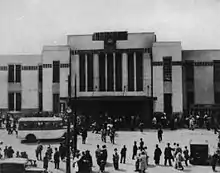
Shinjuku Station opened in 1885 as a stop on Japan Railway's Akabane-Shinagawa line (now part of the Yamanote Line). Shinjuku was still a quiet community at the time and the station was not heavily trafficked at first. The opening of the Chūō Line (1889), Keiō Line (1915) and Odakyū Line (1923) led to increasing traffic through the station.
Japanese government urban planner Kensaburo Kondo designed a major revamp of the station in 1933, which included a large public square on the west side completed in 1941. Kondo's plan also called for extending the Tokyu Toyoko Line to a new underground terminal on the west side of the station, and constructing an east-west underground line that would be served by the Seibu Railway and the Tokyo Kosoku Railway (forerunner of Tokyo Metro), while the Keio and Odakyu lines would use above-ground terminals to the west of the JR station. These plans were suspended upon the onset of World War II but influenced the current layout of the station area.[35] Subway service ultimately began in 1959.

The Seibu Shinjuku Line was extended from Takadanobaba Station to Seibu Shinjuku Station in 1952. Seibu Shinjuku was built as a temporary station pending a planned redevelopment of the east side of Shinjuku Station, which was to feature a large station building that would house a new Seibu terminal on its second floor. Seibu abandoned its plan to use the building due to a lack of space for trains longer than six cars; the building is now known as Lumine Est and retains some design features originally intended to accommodate the Seibu terminal (in particular, a very high ceiling on the first floor and a very low ceiling on the second floor). In the late 1980s, Seibu planned to build an underground terminal on the east side of Shinjuku, but indefinitely postponed the plan in 1995 due to costs and declining passenger growth.[35]
On August 8, 1967, a freight train carrying jet fuel bound for the U.S. air bases at Tachikawa and Yokota collided with another freight train and caught fire on the Chūō Rapid tracks. The incident stoked ongoing political controversy in Japan regarding the Vietnam War.[36] The station was a major site for student protests in 1968 and 1969, the height of civil unrest in postwar Japan. On October 21, 1968, 290,000 marchers participated in International Anti-War Day, taking over Shinjuku station and forcing trains to stop. In May and June 1969, members of the antiwar group Beheiren carrying guitars and calling themselves "folk guerrillas" led weekly singalongs in the underground plaza outside the west exit of the station, attracting crowds of thousands. Participants described it as a "liberated zone" and a "community of encounter."[37] In July, riot police cleared the plaza with tear gas and changed signs in the station to read "West Exit Concourse" instead of "West Exit Plaza." The incident represented a significant defeat for public activism in Tokyo.
There have been plans at various points in history to connect Shinjuku into the Shinkansen network, and the 1973 Shinkansen Basic Plan, still in force, specifies that the station should be the southern terminus of the Jōetsu Shinkansen line to Niigata. While construction of the Ōmiya-Shinjuku link never started and the Jōetsu line presently terminates in Tokyo Station, the right of way, including an area underneath the station, remains reserved.
On May 5, 1995, the Aum Shinrikyo doomsday cult attempted a chemical terrorist attack by setting off a cyanide gas device in a toilet in the underground concourse, barely a month after the gas attack on the Tokyo subway which killed 13, left 6,252 people with non-fatal injuries, severely injured 50 people, and caused 984 cases of temporary vision problems. This time the attack was thwarted by staff who extinguished the burning device.
The station facilities on the Marunouchi Line were inherited by Tokyo Metro after the privatization of the Teito Rapid Transit Authority (TRTA) in 2004.[38]
A major expansion of the JR terminal was completed in April 2016, adding a 32-story office tower, bus terminal, taxi terminal, and numerous shops and restaurants.[39]
In 2020, the east-west free passageway was opened, shortening the time required for pedestrians to pass between the east and west exits by 10 minutes.[40] A major redevelopment of the station and surrounding area began in July 2021 with the aim of improving pedestrian flow and making it easier and faster to cut through the east and west sides of the station. Construction is expected to continue until 2047.[41]
Keiō Shinjuku Station
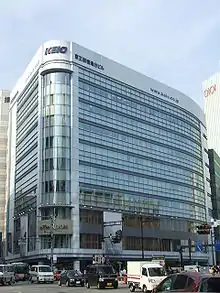
When the Keio Line extended to Shinjuku in 1915, its terminal was located several blocks east of the government railway (presently JR) station. The terminal was first named Shinjuku-Oiwake Station (新宿追分駅) and was on the street near the Isetan department store. In 1927, the station was moved from the street to a newly built terminal adjacent to the original station. The station building housed a department store. The station name was changed to Yotsuya-Shinjuku Station (四谷新宿駅) in 1930 and again to Keiō Shinjuku Station (京王新宿駅) in 1937.
The tracks from the terminal were on the Kōshū Kaidō highway, which crosses the Yamanote Line and the Chūō Line in front of the south entrance of Shinjuku Station by a bridge. The Keiō Line had a station for the access to Shinjuku Station, named Teishajō-mae Station (停車場前駅) and renamed in 1937 Shōsen Shinjuku Ekimae Station (省線新宿駅前駅).
In July 1945, the terminal of the Keiō Line was relocated to the present location, though on the ground level, on the west side of Shinjuku Station. Keiō Shinjuku Station and Shōsen Shinjuku Ekimae Station were closed. This was because the trains faced difficulty in climbing up the slopes of the bridge over the governmental railway after one of the nearby transformer substations was destroyed by an air raid. The site of Keiō Shinjuku Station near Shinjuku-Sanchōme subway station is now occupied by two buildings owned by Keiō: Keiō Shinjuku Sanchōme Building and Keiō Shinjuku Oiwake Building.
Cultural references
The station and other parts of the Toei Ōedo Line are referenced in the Digimon Adventure franchise.[42][43] Contemporary British painter Carl Randall (who spent 10 years living in Tokyo as an artist) depicted the station area in his large oil painting 'Shinjuku', exhibited at the National Portrait Gallery in London 2013.[44][45][46][47]

See also
- List of East Japan Railway Company stations
- List of railway stations in Japan
- Transport in Greater Tokyo
- Gare du Nord, the busiest railway station outside Japan
References
- Busiest station | Guinness World Records
- "Number of passengers by station (best 100)" (in Japanese). JR East. Retrieved June 9, 2021.
- 小田急 新宿駅 可動式ホーム柵 使用 [Platform screens introduced at Odakyu Shinjuku Station]. Tetsudo.com (in Japanese). Japan: Asahi Interactive, Inc. September 12, 2012. Retrieved October 2, 2012.
- "1日の駅別乗降人員|京王グループ". www.keio.co.jp. Retrieved March 21, 2022.
- "Keio Railway Map & Reading Station Signs - Keio Corporation". keio.co.jp. Retrieved January 3, 2017.
- 京王線新宿駅のホームドア整備が完了 [Installation of platform-edge doors completed at Keio Line Shinjuku Station]. Japan Railfan Magazine Online (in Japanese). Japan: Koyusha Co., Ltd. March 13, 2014. Retrieved March 13, 2014.
- Buster Shinjuku Shinjuku-busterminal.co.jp
- 各駅の乗車人員 (2013年度) [Station passenger figures (Fiscal 2013)] (in Japanese). Japan: East Japan Railway Company. Retrieved August 31, 2014.
- 1日平均乗降人員 [Average daily station usage figures] (in Japanese). Odakyu Electric Railway. Retrieved September 12, 2014.
- 1日の駅別乗降人員 [Average daily station usage figures] (in Japanese). Japan: Keio Corporation. 2013. Retrieved August 31, 2014.
- 各駅の乗降人員ランキング [Station usage ranking] (in Japanese). Tokyo Metro. Retrieved August 31, 2014.
- 各駅乗降人員一覧 [Station usage figures] (in Japanese). Tokyo Metropolitan Bureau of Transportation. Retrieved September 9, 2014.
- 日本国有鉄道停車場一覧 [JNR Station Directory]. Japan: Japanese National Railways. 1985. p. 480. ISBN 4-533-00503-9.
- 各駅の乗車人員 (2000年度) [Station passenger figures (Fiscal 2000)] (in Japanese). Japan: East Japan Railway Company. Retrieved January 2, 2013.
- "JR東日本:各駅の乗車人員(2001年度)". www.jreast.co.jp. Retrieved August 27, 2022.
- "JR東日本:各駅の乗車人員(2002年度)". www.jreast.co.jp. Retrieved August 27, 2022.
- "JR東日本:各駅の乗車人員(2003年度)". www.jreast.co.jp. Retrieved August 27, 2022.
- "JR東日本:各駅の乗車人員(2004年度)". www.jreast.co.jp. Retrieved August 27, 2022.
- 各駅の乗車人員 (2005年度) [Station passenger figures (Fiscal 2005)] (in Japanese). Japan: East Japan Railway Company. Retrieved January 2, 2013.
- "JR東日本:各駅の乗車人員(2006年度)". www.jreast.co.jp. Retrieved August 27, 2022.
- "JR東日本:各駅の乗車人員(2007年度)". www.jreast.co.jp. Retrieved August 27, 2022.
- "JR東日本:各駅の乗車人員(2008年度)". www.jreast.co.jp. Retrieved August 27, 2022.
- "JR東日本:各駅の乗車人員(2009年度)". www.jreast.co.jp. Retrieved August 27, 2022.
- 各駅の乗車人員 (2010年度) [Station passenger figures (Fiscal 2010)] (in Japanese). Japan: East Japan Railway Company. Retrieved January 2, 2013.
- 各駅の乗車人員 (2011年度) [Station passenger figures (Fiscal 2011)] (in Japanese). Japan: East Japan Railway Company. Retrieved August 31, 2014.
- 各駅の乗車人員 (2012年度) [Station passenger figures (Fiscal 2012)] (in Japanese). Japan: East Japan Railway Company. Retrieved August 31, 2014.
- "各駅の乗車人員 2014年度 ベスト100:JR東日本". www.jreast.co.jp. Retrieved August 27, 2022.
- "各駅の乗車人員 2015年度 ベスト100:JR東日本". www.jreast.co.jp. Retrieved August 27, 2022.
- "各駅の乗車人員 2016年度 ベスト100:JR東日本". www.jreast.co.jp. Retrieved August 27, 2022.
- "各駅の乗車人員 2017年度 ベスト100:JR東日本". www.jreast.co.jp. Retrieved August 27, 2022.
- "各駅の乗車人員 2018年度 ベスト100:JR東日本". www.jreast.co.jp. Retrieved August 27, 2022.
- "各駅の乗車人員 2019年度 ベスト100:JR東日本". www.jreast.co.jp. Retrieved August 27, 2022.
- "各駅の乗車人員 2020年度 ベスト100|企業サイト:JR東日本". JR東日本:東日本旅客鉄道株式会社 (in Japanese). Retrieved August 27, 2022.
- "各駅の乗車人員 2021年度 ベスト100|企業サイト:JR東日本". JR東日本:東日本旅客鉄道株式会社 (in Japanese). Retrieved August 27, 2022.
- "西武新宿駅はなぜ遠いのか 幻の東口乗り入れ計画". The Nikkei. November 23, 2012. Retrieved May 6, 2016.
- Havens, Thomas R. H. (2014). Fire Across the Sea: The Vietnam War and Japan 1965-1975. Princeton University Press. pp. 126–127. ISBN 9781400858439.
- Konaka Yotaro, "Shinjuku: Community of Encounter," Japan Quarterly, 38 no.3 (1991), 301–310.
- "「営団地下鉄」から「東京メトロ」へ" [From "Teito Rapid Transit Authority" to "Tokyo Metro"]. Tokyo Metro Online (in Japanese). July 8, 2006. Archived from the original on May 16, 2012. Retrieved May 29, 2022.
- "新宿駅が生まれ変わります" (PDF). East Japan Railway Company. Retrieved May 6, 2016.
- "East-West Passageway Opens at JR Shinjuku Station". Nippon.com. July 19, 2020. Retrieved January 26, 2021.
- Steen, Emma (March 15, 2022). "Shinjuku Station is getting a ¥72.8 billion makeover to make it easier to navigate". Time Out Tokyo. Retrieved June 1, 2022.
- "Odaiba Memorial – Shinjuku". marron.extracaffeine.com. Archived from the original on December 22, 2015. Retrieved December 15, 2015.
- "Odaiba Memorial – Hikarigaoka". marron.extracaffeine.com. Archived from the original on December 22, 2015. Retrieved December 15, 2015.
- BBC World Service: World Update. 'Carl Randall - Painting the faces in Japan's crowded cities'., BBC, 2016
- BBC News. 'Painting the faces in Japan's crowded cities'., BBC News - Arts & Entertainment, 2016
- BP Portrait Award 2013, The National Portrait Gallery, London, 2013
- 'Shinjuku painting'., Carl Randall artist website, 2016
External links
- JR map of Shinjuku Station
- map of Odakyu Shinjuku Station
- map of Toei Subway Shinjuku Station (in Japanese)
- map of Tokyo Metro Shinjuku Station (in Japanese)

